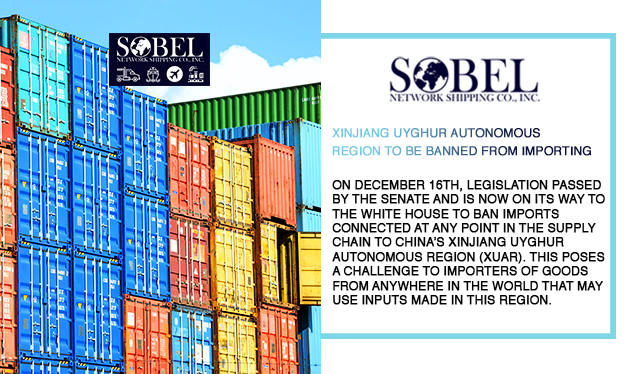On December 16th, legislation passed by the Senate and is now on its way to the White House to ban imports connected at any point in the supply chain to China’s Xinjiang Uyghur Autonomous Region (XUAR). This poses a challenge to importers of goods from anywhere in the world that may use inputs made in this region.
The Uyghur Forced Labor Prevention Act basically states that all or part of goods manufactured in the XUAR are made with forced labor, therefore are prohibited from entry into the US. The only way this can be bypassed is if the importer provides “clear and convincing evidence” to CBP that the goods were not made with forced labor, and that the importer has fully complied with due diligence guidance and regulations to be issued by the US government and responded to all related to CBP inquiries.
Taking effect 180 days after the bill is signed into law, the import ban will remain in effect for 8 years. Requiring a holistic government effort to develop within six months and update annually as well, it creates a strategy for preventing imports of goods manufactured in the XUAR with forced labor, including through measures such as tracing the origin of goods, offering greater supply chain transparency, as well as identifying third country supply chain routes.
This will eventually identify ways that goods made through forced labor in China could be imported through third countries and reduce this risk. It will list entities in the XUAR that produce or export goods made with forced labor and just what they are. It will note which facilities and entities that source from the XUAR materials made under programs that require forced labor, as well as enforcement plans for each (such as withholding release orders); as well as identify high priority sectors for enforcement. This will include things like cotton, tomatoes, and polysilicon, enforcing a plan for each. It will even provide recommendations for how CBP can accurately identify and trace goods manufactured in XUAR, describe how CBP plans to use legal authorities and other tools to prevent the import of goods made with forced labor. This will include but is not limited to, pilot programs to test the viability of technologies to assist in the examination of goods.
To ensure they prevent the importation of goods made with forced labor, they will provide guidance to importers on best practices, due diligence measures, and supply chain tracking measures; including guidance type, nature, and extent of evidence. Though it doesn’t include financial disclosures from US publicly-traded businesses about their engagement with Chinese companies, other entities engaged in mass surveillance, internment, forced labor, and other serious human rights abuses in the XUAR.
Sobel will be making sure that there is a comprehensive adherence to this new law, monitoring information from CBP to ensure compliance. For our importers, the burden of a forced-labor supply chain falls to your companies in the eyes of the government, and more importantly, Customs and Border Protection. Importers should be prepared to defend every component in a finished article from sourcing, through to transport for assembly or further manufacture in order to prevent the goods from being detained and seized.
For more information about the resources available to monitor raw materials and components as they move through the supply chain, contact your Sobel representative today.


